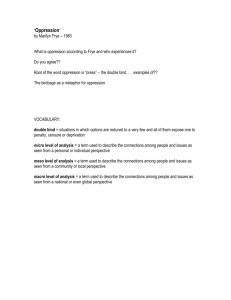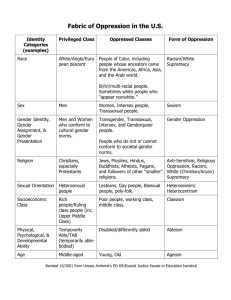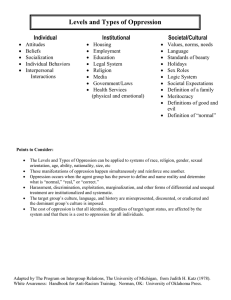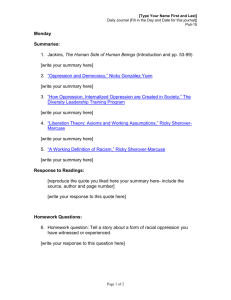Unit 3: Three Phase Composition Research: Overcoming Oppression Model
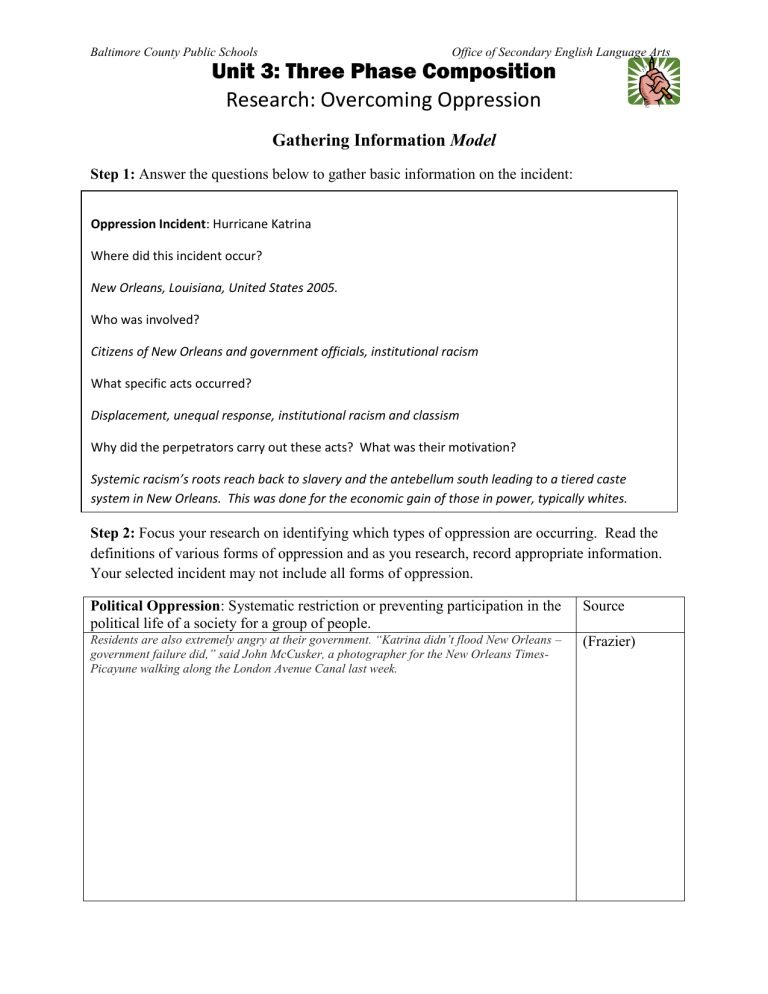
Baltimore County Public Schools Office of Secondary English Language Arts
Unit 3: Three Phase Composition
Research: Overcoming Oppression
Gathering Information Model
Step 1: Answer the questions below to gather basic information on the incident:
Oppression Incident: Hurricane Katrina
Where did this incident occur?
New Orleans, Louisiana, United States 2005.
Who was involved?
Citizens of New Orleans and government officials, institutional racism
What specific acts occurred?
Displacement, unequal response, institutional racism and classism
Why did the perpetrators carry out these acts? What was their motivation?
Systemic racism’s roots reach back to slavery and the antebellum south leading to a tiered caste system in New Orleans. This was done for the economic gain of those in power, typically whites.
Step 2: Focus your research on identifying which types of oppression are occurring. Read the definitions of various forms of oppression and as you research, record appropriate information.
Your selected incident may not include all forms of oppression.
Political Oppression : Systematic restriction or preventing participation in the political life of a society for a group of people.
Residents are also extremely angry at their government. “Katrina didn’t flood New Orleans – government failure did,” said John McCusker, a photographer for the New Orleans Times-
Picayune walking along the London Avenue Canal last week.
Source
(Frazier)
Baltimore County Public Schools Office of Secondary English Language Arts
Unit 3: Three Phase Composition
Research: Overcoming Oppression
Economic Oppression : Systematic targeting of a group for the economic gain of another. Ex: Forced or bonded labor, serfdom, excessively low wages, etc.
The contiguous neighborhoods of the predominately African American Lower Ninth Ward and the White, working class communities in St. Bernard parish were similarly affected during
Hurricane Katrina. However, government response was markedly different for these communities.
A majority of those suffering, Mr. Bush noted, were lower-income minorities. "That poverty has its roots in the history of racial discrimination, which cut off generations from the opportunities of America. We have a duty to confront this poverty with bold action."
Source
Goodman &
West-Olatunji, 4.
Greene
Social Oppression : Systematic targeting of one group of people within a society over another group of people on the basis of background.
The media provided documentation of this unequal treatment with images projected worldwide that illuminated the faces of mostly poor and almost exclusively African American survivors abandoned on rooftops.
In the midst of failed governmental responses, low-income African Americans are hit hardest and as a result may be experiencing additional psychological distress.
You know, they didn’t care about us then, and I look around here and I know they don’t care about us now. I wouldn’t put it past them to have dynamited the levees this time too, just to save the Quarter. I’ve been living here my whole life and I don’t trust them. Just like my parents didn’t trust them. You look around and you can see why – but it’s been like that since before the storm. I see it every day when I go to work and I know the kind of school my kids go to. They just don’t get treated the same. I cry sometimes at night, just knowing that my kids are growing up in the same world I did. Sometimes when I hear people talk down to them or to me, it just makes me so mad. Sometimes I end up fighting with my husband, just because I can’t stand the way I feel.
Source
Goodman &
West-Olatunji, 4.
Goodman &
West-Olatunji, 4
Goodman &
West-Olatunji, 10
Source Belief Oppression : Systematic mistreatment of one group of people based on their religious beliefs.
Baltimore County Public Schools Office of Secondary English Language Arts
Unit 3: Three Phase Composition
Research: Overcoming Oppression
